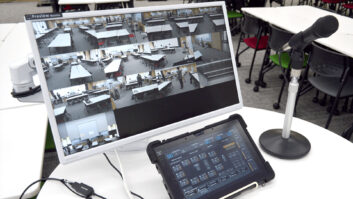
Security Watch:
Homeland Security Spurs Innovation
Feb 1, 2007 12:01 PM,
By Bret Bass
DHS opens its doors to small businesses.

The government believes that private-sector technology is key to improving national security efforts.
In the summer of 2003, former Assistant NYPD Commissioner Charles Connolly said that law enforcement could no longer ignore the potential for a public-private security partnership. “I found it difficult to understand why many police chiefs did not want to recruit another army,” Connolly said. “They don’t have to pay for it. They don’t have to be responsible for its operational success or failure.” And Connolly was not alone.
Since 2005, the government has given more than $600 million to private companies such as Boeing, Magal Security Systems, Oracle, IPIX, and International Microwave to help protect our ports, borders, and airports. And nearly all the money went to companies specializing in access-control and surveillance systems.
Government security agencies struggle with budget constraints, limited resources, bureaucracy, and virtually no internal technology or product development. Awarding $600 million to private businesses is, for the government, a wiser allocation of funds. Private companies have the experience, the technology, the products, and the resources to take on large security projects quickly and efficiently. And with the government calling for access-control, behavior-recognition, and video-surveillance systems in schools, airports, civic buildings, hospitals, and along the borders, unprecedented growth opportunities now exist for integrators experienced in the design and installation of these systems.
THE NEED FOR PRIVATE-PUBLIC SECURITY
The attacks on New York in 2001 raised public awareness of deficiencies in existing security policies and systems. As a result, the measures taken to redress these issues paved the way for streamlining communication between civilian and government responders, and forced government to re-evaluate the potential role of private industry in Homeland Security efforts.
In 2005, the Department of Justice released the report, “Engaging the Private Sector to Promote Homeland Security: Law Enforcement-Private Security Partnerships,” which asserts that engaging private security firms more actively in law enforcement is “critical to preventing terrorism and terror-related acts.” The private sector owns and protects 85 percent of the nation’s infrastructure, and the government is realizing that the resources, advanced technology, and specialized knowledge of security companies can be put to greater use.
The Department of Homeland Security (DHS) responded by creating the Small Business Innovation Research (SBIR) program. The goal of SBIR is to increase the participation of small businesses in federal security initiatives and solutions. Currently, about three percent of the annual extramural budget is reserved for awards to small businesses.
Although the process of obtaining DHS grants at the federal level can be cumbersome, the good news for security professionals is that the bulk of this funding is being allocated to DHS branches operated at the state level, which are seeking private businesses to contract. States such as Maryland are soliciting private companies to secure and operate their ports. New York is offering hundreds of thousands of dollars to companies that can safeguard public water supplies.
The Homeland Security Market Development (HSMD) Bureau within the Illinois Department of Commerce and Economic Opportunity (DCEO) offers a variety of financial incentives aimed at fostering the homeland security industry’s growth by supporting new and existing security businesses. The bureau’s grants serve to accelerate the commercialization, improvement, and production of goods and services with an application in both the homeland security and commercial sectors. Not only do the DCEO’s Innovative Product Grants (IPG) assist with homeland security, they provide new opportunities for the local economy. IPGs allow security firms to grow, expand their suite of services, create new jobs within the community as a result of increased staffing needs, and facilitate profitable joint ventures between businesses in the area.
Government agencies are not the only forces driving these initiatives. Former U.S. Attorney General John Ashcroft has formed a company, Ashcroft Group, with the goal of helping security firms find business with federal agencies. Ashcroft says the Office of Management and Budget (OMB) expects to raise nearly $60 billion in homeland security funding by 2007, and he intends to invest in and lobby for companies specializing in security technologies.
TECHNOLOGY INNOVATIONS
Perhaps the best news for systems integrators and manufacturers is that these programs are focusing primarily on technology-based solutions. Physical security has been criticized as homeland security’s weakest link. According to a 2003 USA Today study, “Most of the nation’s one-million-plus guards are unlicensed, untrained, and not subject to background checks. Their burgeoning $12 billion-a-year industry is marked by high turnover, low pay, few benefits, and scant oversight. And according to government officials and industry experts, little has changed since Sept. 11, 2001.”
Further evidence of problems came this past July when investigators from the Government Accountability Office (GAO) successfully passed enough concealed radioactive material through U.S. borders to make two “dirty bombs.” In situations where Customs and Border Protection agents correctly identified the material, they failed to verify that the investigators’ identification and documentation as counterfeit.
The government believes technology is key to strengthening physical security, engaging manufacturers such as Honeywell and GE Infrastructure in homeland security projects. Both companies offer video surveillance products, wireless and IP alarm transmitters, and access control systems, and they are venturing into behavioral recognition programs. These are features people such as Ashcroft view as essential in the new era of security, and private companies are delivering the goods.
GE’s VideoIQ DVR series, for instance, detects human activity with 95 percent accuracy. The intelligent system can distinguish between people and other objects, like animals or cars, while “learning” to ignore repetitive background motion caused by waving tree branches or rippling water. The system builds a database of all it has learned, enabling it to differentiate between the disparate objects it encounters.
GE also unveiled ClearCast, a video product tailored to the needs of airports, hospitals, and government facilities. This DVR archives 30 days of continuous video at 30fps. To meet the operational needs of large facilities, the system can capture video from thousands of cameras using modular, scaleable stations. And when using enterprise solutions from companies such as GE, installers have the advantage of total integration with all system components, including the automation software used for monitoring the applications.
Government and military agencies have also been using DVRs from smaller companies, such as Synergetic Technologies. With compression as low as 0.5KB per frame, the Synergetic DVRs can store up to 90 days of video footage on a single hard drive. Bandwidth requirements for the unit are only 14.4KBps, allowing remote access to streaming video and audio from any Internet connection. Users can even retrieve live video on PDA devices — a feature that’s essential to security operatives in the field.
The government recognizes that interactive security systems have evolved. No longer limited to protecting private property, they have become tools for securing public spaces. While the government seeks manufacturers to produce and supply the equipment, experienced companies capable of installing, monitoring, and maintaining these systems are equally important. That’s where you come in.
As the DHS continues to open the doors for small businesses to enter the expanding homeland security market, opportunities abound for security professionals. It’s time to take your business to the next level.
Bret Basshas been a security industry specialist for the last 16 years, focusing on the development of interactive and investigative systems such as video surveillance, access control, and remote monitoring.









